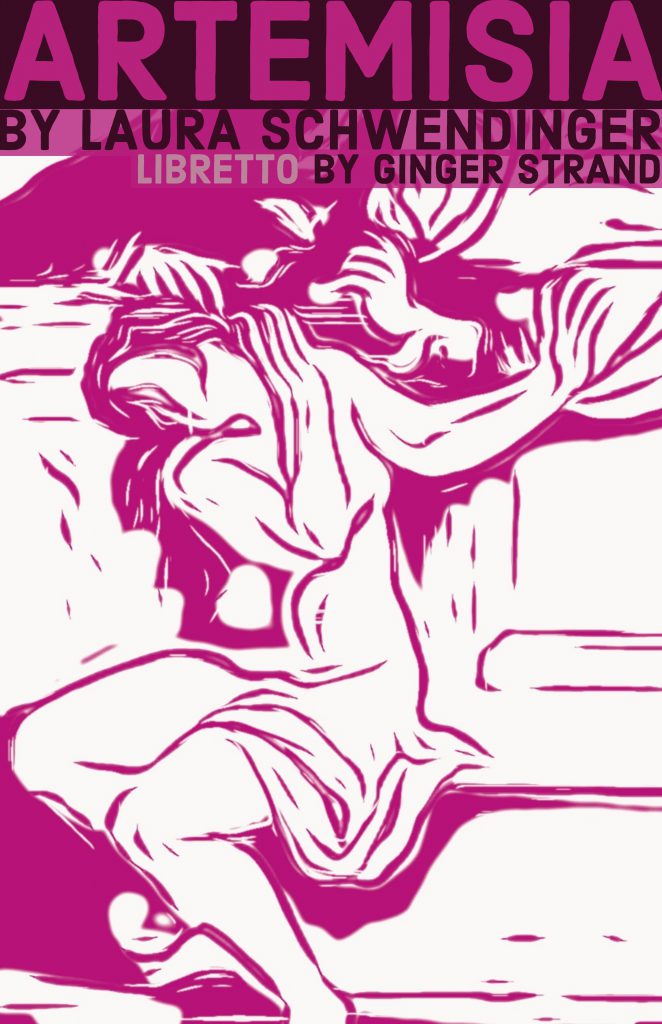This Saturday, the Center for Contemporary Opera presents scenes from an opera composed by Laura Schwendinger, libretto by Ginger Strand.
Leonard Nimoy Thalia Theatre
Saturday November 3rd, 2018 8pm
2537 Broadway at 95th Street
New York City
Conductor Sara Jobin
Stage Director Fred Ambrose
Pianist Jerome Tan
Cast:
Artemisia Augusta Caso
Tommaso Blake Friedman
Susanna Jennifer Sgroe
Abra/Tuzia Anastasiya Roytman
Elder 1 Daniel Folz-Morrison
Elder 2 Kevin Johnson
Synopsis
Artemisia Gentileschi was born in Rome in 1593, the eldest child of the Tuscan painter Orazio Gentileschi and was one of the most important followers of the Caravaggist style. Artemisia Gentileschi achieved renown in an era when women painters were not accepted by patrons and was the first women member of the Accademia di Arte del Disegno in Florence. Her painting of the Judith story, Judith Slaying Holofernes, is perhaps the most well-known of the subject in art. As a sixteen year-old, Artemisia was raped by Agostino Tassi, while she was studying with him. Orazio pressed charges against Tassi. Artemisia was subjected to torture to verify her testimony. At the conclusion of the trial, Tassi was sentenced to prison for one year, but never served. The court case seemed to overshadow Artemisia’s achievements as an artist for many years, however today, she is regarded as one of the most advanced painters of her time.
In a Tableau Vivant of Artemisia’s great painting “Susanna and the Elders”, we see the canvas come alive as an autobiographical scene. In Artemisia’a fevered mind, Susanna now embodies Artemisia as a young woman, on the day Agostino Tassi raped her.
She is in her garden, bathing. The bees hum and swirl around her, heard in the florid lines of wind instruments that spiral around Susanna’s vocal lines. The elderly men behind the wall watch and harass her, threatening to rape her if she does not offer herself to them. In the tableau vivant, the two men now become Agostino Tassi and Cosimo de Medici. The two that came the day Artemisia was raped. The elderly Artemisia enters the scene and starts to question Tassi, Cosimo and Susanna, as the embodiment of the young Artemisia. In this moment, the elder Artemisia is the inquisitor and through this “inquisition” Artemisia relives the most horrible day of her life, when Agostino Tassi raped her.

She painted a lot of bare skin!!
The New York Times has been posting obits of women of spirit and accomplishment that had not been posted at the time of their death. The NYT will have lots of material to post over the next couple of decades.
Getting the strange impression Menzie is telling us he will be busy this Saturday. Busy enough to excuse him from updating some of our silly comments. Hope he enjoys himself exceedingly. Patronage of the arts is a great virtue in my book. Although I am just a tad jealous. Only a smidgeon. Hey—Mastodon, Motorhead, and Metal Rock CDs galore from the public library supplemented by basic Youtube for some of us and Classical music and operatic theater for others. Hey kids, what can I say?? I didn’t study as much as my Dad wanted me to. Er something.
wonderful accomplishment. stagetime on broadway is no small feat! kudos.
OK back to the trade wars with China. Oprah Winfrey visits Georgia to support the Democratic candidate for governor which got Mike Pence all whiny. MSNBC skipped that and decided to go eat some pecans with the local farmers. Did I say pecans are a big deal in Georgia. And it seems that China has slapped them with a 47% tariff:
https://www.southwestfarmpress.com/crops/chinese-tariffs-threaten-us-pecan-industry
If it aint by Donnezetti , Puccinni, Rossini or Verdi than it aint opera
Trivia: Opera meets politics.
Verdi’s operas were associated with the Italian unification not only because of their themes and storylines, but also because of Verdi’s name. Verdi became a kind of acronym for “Victor Emmanuel Rex Dei [Gratia] Italiae”, meaning “Victor Emmanuel, King of Italy by the Grace God”.
Oklahomans don’t have a stellar reputation for their intelligence or education levels. Exhibit A:
https://www.youtube.com/watch?v=8UjaxT468cw&t=3s